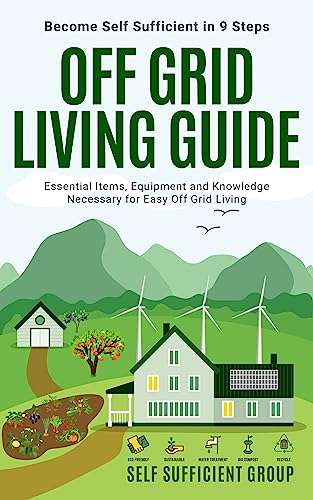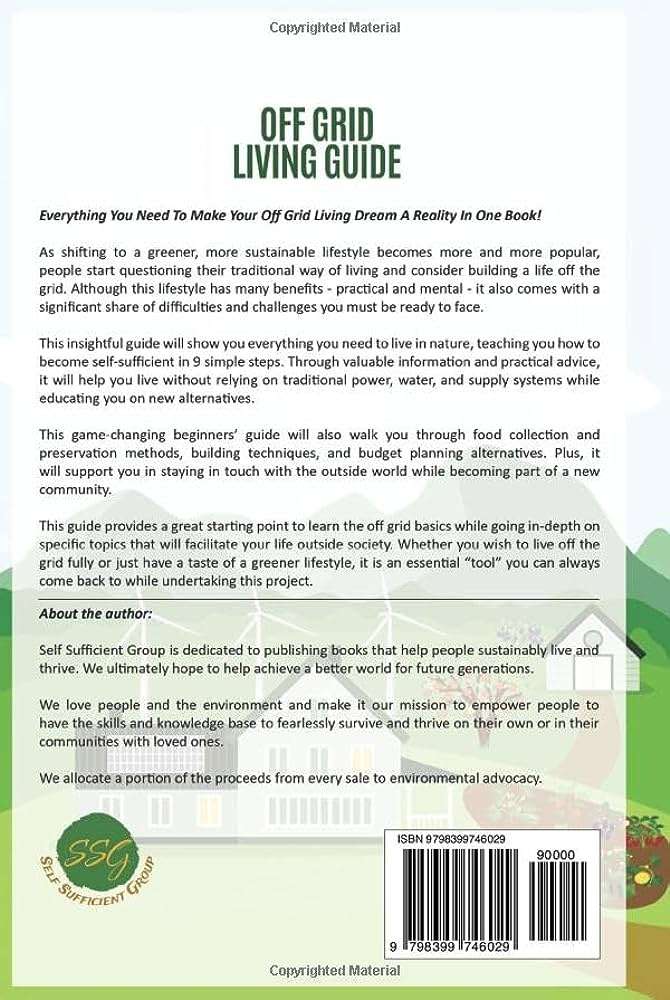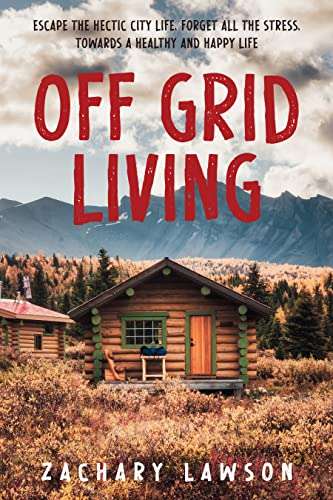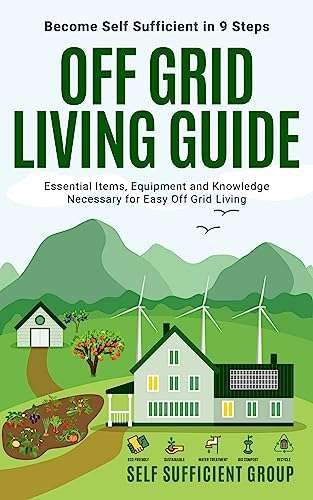In this article, we will explore the topic of achieving self-sufficiency through off grid living. You will learn what it means to live off the grid and become more self-reliant. We will discuss the advantages and challenges of this lifestyle and provide practical tips and strategies for those interested in pursuing it. By the end, you will have a better understanding of off grid living and the steps you can take towards becoming self-sufficient.
Achieving Self-Sufficiency: A Guide to Off Grid Living
Introduction
Off-grid living has gained significant popularity in recent years as people seek to become more independent and self-sufficient in their lifestyles. This alternative way of living involves disconnecting from traditional utilities such as electricity, water, and waste management, and instead relying on renewable resources and creative solutions to meet one’s needs. While off-grid living certainly presents its fair share of challenges, it also offers numerous advantages and the opportunity to live a more sustainable and fulfilling life. In this guide, we will explore the ins and outs of off-grid living, including the factors to consider when choosing a location, energy generation and management, water and waste management, food production and preservation, building and shelter, self-sufficiency in healthcare, financial considerations, community and support networks, technology and communication, education and personal development, environmental stewardship, and maintaining mental and emotional wellbeing.
What is Off Grid Living?
Off-grid living refers to living without the reliance on public utilities and infrastructure. It means generating your own electricity, collecting and filtering your own water, managing your waste independently, and producing your own food. Off-grid living encourages a more self-reliant lifestyle and reduces our carbon footprint by minimizing reliance on non-renewable resources. It offers individuals and families the opportunity to become more in tune with nature and their own abilities.

Advantages of Off Grid Living
Living off-grid brings numerous advantages and benefits. Firstly, it allows you to become self-sufficient and less reliant on external resources. By generating your own power and producing your own food, you are not only reducing your expenses but also gaining a sense of independence and resilience. Off-grid living also provides the opportunity to live a more sustainable lifestyle. By relying on renewable energy sources and adopting eco-friendly practices, you are contributing towards the preservation of the environment. Additionally, off-grid living often grants individuals a greater sense of freedom and connection with nature, as you are not bound by the constraints of traditional living. Finally, off-grid living is an opportunity to simplify your life. By reducing your reliance on material possessions and focusing on the essentials, you can lead a more intentional and fulfilling life.
Challenges of Off Grid Living
While off-grid living comes with numerous advantages, it also presents its fair share of challenges. One of the main challenges is the initial cost of setting up an off-grid system. Installing solar panels, wind turbines, and other renewable energy sources can require a significant upfront investment. Additionally, off-grid living requires a certain level of technical knowledge and skills. Maintaining and troubleshooting energy systems and water management systems can be complex and time-consuming. Furthermore, off-grid living may require adjustments in lifestyle, as energy and water usage need to be monitored and conserved. Finally, living off-grid can be isolating, especially for those who are accustomed to the convenience and social interactions of traditional living. It’s important to consider these challenges and prepare adequately before embarking on an off-grid lifestyle.

Is Off Grid Living for Everyone?
Off-grid living may not be for everyone, as it requires a significant commitment and lifestyle change. It is crucial to assess your personal circumstances, priorities, and abilities before deciding to embrace an off-grid lifestyle. Consider your level of self-sufficiency, your willingness to learn new skills, and your adaptability to the challenges that may arise. It is also important to recognize that off-grid living does not necessarily mean complete isolation. Many off-grid communities and support networks exist, offering the opportunity to connect with like-minded individuals and share resources and knowledge. Ultimately, off-grid living is a personal decision that requires careful consideration and planning.
Choosing the Right Location
Choosing the right location is crucial for successful off-grid living. Several factors must be considered when selecting a suitable location.
Factors to Consider
The first factor to consider is the availability of natural resources. Assess the potential for solar power, wind energy, and hydroelectric power based on the climate and topography of the area. Additionally, consider the availability of water sources, such as rivers, lakes, or underground aquifers.
Access to Resources
Evaluate the accessibility of natural resources and materials needed for off-grid living. Consider the proximity to forests for sourcing wood for heating and building, as well as the availability of fertile soil for gardening. Additionally, ensure easy access to suppliers for any additional resources that may be required.
Climate and Weather Conditions
Evaluate the climate and weather conditions of the location. Consider the average temperature, rainfall, and the presence of extreme weather events. This information will help determine the most suitable energy generation methods and building techniques for your specific location.
Legal Considerations
Before settling on a location, familiarize yourself with local building codes, zoning regulations, and any restrictions on alternative energy systems. Ensure that the chosen location allows for off-grid living and that you comply with all legal requirements.

Energy Generation and Management
Energy generation and management are key aspects of off-grid living. Here are several methods to consider:
Solar Power Systems
One of the most common and reliable methods of generating energy off-grid is through solar power systems. Solar panels collect sunlight and convert it into electricity, which can then be used to power appliances and devices in your home. Investing in high-quality solar panels, storage batteries, and an efficient inverter system is crucial for an effective solar power setup.
Wind Turbines
If your location experiences consistent winds, wind turbines can be a valuable addition to your energy generation system. Wind turbines convert wind energy into electricity, which can be stored and used as needed. However, it is important to assess the wind patterns and ensure there is enough consistent wind to generate a sufficient amount of electricity.
Hydroelectric Power
For locations with access to running water, hydroelectric power can be a viable option. Small-scale water turbines can be set up in rivers or streams to generate electricity. This method provides a consistent and reliable source of energy, as long as there is a steady flow of water throughout the year.
Biomass and Biofuel
Biomass and biofuel energy systems utilize organic materials such as wood, crop waste, or animal manure to generate heat and electricity. These systems are particularly useful for heating homes and cooking.
Water and Waste Management
Off-grid living requires careful management of water and waste resources. Here are some methods to consider:
Collecting and Storing Rainwater
Collecting and storing rainwater is essential for off-grid living. Install a rainwater collection system with gutters, downspouts, and a storage tank to capture and store rainwater. This water can be used for drinking, cooking, cleaning, and watering plants.
Purifying and Filtering Water
Rainwater and other water sources need to be purified and filtered to ensure their safety for consumption. Invest in a reliable water filtration system that removes contaminants and bacteria. Additionally, consider natural purification methods such as boiling or using ultraviolet light.
Composting Toilets
Traditional flushing toilets require a significant amount of water and may not be suitable for off-grid living. Composting toilets provide an alternative solution by converting human waste into nutrient-rich compost. These systems are environmentally friendly and require minimal water usage.
Greywater Systems
Greywater is wastewater generated from activities such as washing dishes, laundry, and showering. Implementing a greywater system allows you to recycle and reuse this water for irrigation purposes. It is essential to properly filter and treat greywater to minimize the risk of contamination.

Food Production and Preservation
Off-grid living offers the opportunity to produce your own food and reduce reliance on external sources. Here are some methods to consider:
Organic Gardening
Setting up an organic garden is a key aspect of off-grid living. Grow a variety of fruits, vegetables, and herbs using natural fertilizers and pest control methods. Organic gardening ensures a steady supply of fresh and nutritious food.
Permaculture Techniques
Permaculture is a sustainable agricultural approach that works in harmony with nature. By designing ecosystems that mimic natural patterns, permaculture maximizes the productivity and sustainability of food production. Incorporate permaculture techniques such as companion planting, water harvesting, and soil regeneration into your off-grid garden.
Raising Livestock
For those with enough space and resources, raising livestock such as chickens, goats, or rabbits can provide a valuable source of food. Animals can also contribute to soil fertility and assist in waste management.
Food Preservation Methods
Preserving excess produce is crucial for ensuring a year-round food supply. Explore various food preservation methods, including canning, drying, fermenting, and freezing. These methods allow you to store surplus food for extended periods without the need for refrigeration.
Building and Shelter
Choosing sustainable materials and adopting energy-efficient building techniques are essential for off-grid living. Consider the following:
Choosing Sustainable Materials
Opt for eco-friendly and sustainable building materials such as reclaimed wood, recycled materials, and natural fibers. These materials minimize the environmental impact of construction and promote a healthier living environment.
Passive Solar Design
Incorporate passive solar design principles into your home to maximize natural heating and cooling. Orientate your building to capture and utilize sunlight efficiently, and utilize thermal mass for heat storage. Adequate insulation and energy-efficient windows are also crucial for maintaining a comfortable indoor temperature.
Insulation and Energy Efficiency
Proper insulation and energy-efficient practices are vital for reducing energy consumption. Invest in high-quality insulation materials and seal any gaps or drafts. Additionally, use energy-efficient appliances and lighting to minimize electricity usage.
Alternative Construction Methods
Explore alternative construction methods such as straw bale construction or earthbag building. These techniques often utilize locally available materials and result in highly energy-efficient and sustainable structures.

Self-Sufficiency in Healthcare
Off-grid living extends to healthcare as well, minimizing reliance on traditional medical systems. Consider the following:
Herbal Medicine
Learn about herbal medicine and natural remedies for common ailments. Cultivate a medicinal herb garden and explore different herbal preparations to treat various health conditions.
First Aid and Emergency Preparedness
Develop first aid skills and create an emergency preparedness kit. Living off the grid often means being farther away from medical facilities, so it is crucial to be prepared to handle minor injuries and emergencies.
Natural Remedies
Familiarize yourself with natural remedies and alternative healing modalities such as aromatherapy, essential oils, and homeopathy. These practices can be effective in promoting overall wellbeing and treating common ailments.
Essential Oils and Aromatherapy
Utilize essential oils and aromatherapy for their therapeutic properties. Essential oils can be used for various purposes, including relaxation, pain relief, and improving respiratory health.
Financial Considerations
Off-grid living often involves a restructuring of finances and budgeting. Consider the following:
Budgeting and Planning
Develop a detailed budget and financial plan that accounts for the initial setup costs of off-grid living, ongoing maintenance, and everyday expenses. Identify potential income sources and align your financial goals with your off-grid lifestyle.
Generating Income Off Grid
Explore opportunities to generate income while living off-grid. This can include selling surplus produce, homemade products, or offering services such as workshops or consultations related to off-grid living.
Bartering and Trade
Engage in bartering and trade within your off-grid community. Exchange goods and services with neighbors and fellow off-gridders, creating a self-sustaining local economy.
Long-Term Financial Sustainability
Ensure long-term financial sustainability by saving and investing wisely. Consider options such as creating an emergency fund, diversifying income sources, and making sustainable investments.
Community and Support Networks
Building relationships and fostering a supportive community is essential for successful off-grid living. Consider the following:
Building Relationships
Strengthen bonds with neighbors, fellow off-gridders, and local communities. Engage in activities that promote social interaction and cooperation, such as community gardens or shared work projects.
Sharing Skills and Resources
Participate in skill-sharing initiatives and contribute your knowledge and expertise to the community. Engaging in reciprocal relationships where skills and resources are exchanged enhances self-sufficiency and builds a supportive network.
Creating a Supportive Community
Form or join an off-grid community that shares similar values and goals. By living in close proximity to like-minded individuals, you can pool resources, knowledge, and support.
Joining Existing Off Grid Communities
Consider joining existing off-grid communities or intentional communities. These communities often offer established infrastructure, shared resources, and a sense of belonging.
Technology and Communication
While off-grid living promotes simplicity, technology and communication are still necessary. Consider the following:
Internet Connectivity
Explore options for reliable internet connectivity, as it is important for tasks such as remote work, online learning, and staying connected with the outside world. Satellite internet, wireless technology, or community networks may be viable options.
Alternative Communication Methods
Consider alternative communication methods in case traditional means such as phone lines or cellular networks are unavailable. Options include CB radios, satellite phones, or amateur radio networks.
Off Grid Entertainment
Find creative ways to entertain yourself and your family without relying on traditional forms of entertainment. Embrace outdoor activities such as hiking, gardening, or stargazing, and engage in indoor pursuits like reading, board games, or DIY projects.
Security and Surveillance
Maintain security and ensure the safety of your off-grid home. Install security systems, such as motion sensor lights or surveillance cameras, to deter potential intruders. Additionally, develop emergency protocols and establish communication channels for safety.
Education and Personal Development
Off-grid living provides ample opportunities for education and personal growth. Consider the following:
Home Schooling
Home schooling allows you to tailor education to suit your values and priorities. Create a curriculum that combines academic learning with practical skills, environmental stewardship, and personal development.
Learning Practical Skills
Take advantage of the off-grid lifestyle to learn practical skills that enhance self-sufficiency. Master skills such as gardening, carpentry, cooking from scratch, and water management, as well as any specific trades or crafts that interest you.
Self-Improvement and Mindfulness
Embrace the opportunity for self-improvement and personal growth. Engage in mindfulness practices, meditation, or yoga to cultivate mental and emotional wellbeing. Read books or listen to podcasts that inspire and motivate you, and take time for self-reflection and introspection.
Embracing a Sustainable Lifestyle
Live in harmony with nature and consciously make choices that align with a sustainable lifestyle. Embrace the principles of reduce, reuse, and recycle, and minimize your environmental impact by adopting eco-friendly practices in all aspects of daily life.
Environmental Stewardship
Off-grid living provides a unique opportunity to actively contribute to environmental stewardship. Consider the following:
Reducing Waste and Pollution
Implement strategies to reduce waste and pollution in your daily life. Embrace practices such as composting, recycling, and upcycling, and strive to minimize your ecological footprint.
Conservation and Resource Management
Practice resource management by using resources efficiently and avoiding unnecessary waste. Conserve water, energy, and materials in all aspects of your lifestyle.
Protecting Local Ecosystems
Take an active role in protecting and preserving the local ecosystems. Engage in activities such as tree planting, habitat restoration, or participating in community conservation initiatives.
Sustainable Land Use Practices
Implement sustainable land use practices on your property. Embrace regenerative agriculture techniques, promote soil health, and preserve biodiversity by creating habitat for wildlife.
Maintaining Mental and Emotional Wellbeing
Living off the grid can sometimes be challenging, and it is crucial to prioritize mental and emotional wellbeing. Consider the following:
Mindfulness and Meditation
Practice mindfulness and meditation to promote mental clarity, reduce stress, and cultivate a sense of inner peace. These practices can help you stay grounded and find balance in the face of challenges.
Dealing with Isolation
Develop strategies for coping with potential feelings of isolation. Prioritize social connections and maintain regular communication with loved ones. Create opportunities for community engagement and seek support from fellow off-gridders.
Finding Balance and Purpose
Define your values and priorities, and strive to align your lifestyle choices with them. Set goals that give you a sense of purpose and fulfillment, and find a healthy balance between work, leisure, and personal time.
Cultivating Relationships
Foster healthy relationships with family, friends, and community members. Invest time in building and nurturing meaningful connections, as strong relationships are essential for overall wellbeing and resilience.
Conclusion
Off-grid living offers a unique and fulfilling way of life that promotes self-sufficiency, sustainability, and connection with nature. Achieving self-sufficiency requires careful consideration and planning in various aspects of daily life, including energy generation and management, water and waste management, food production and preservation, building and shelter, healthcare, financial considerations, community building, technology and communication, education and personal development, environmental stewardship, and mental and emotional wellbeing. By embracing the principles and practices of off-grid living, you have the opportunity to live a more intentional, resilient, and sustainable life and contribute to a brighter future for yourself and the planet.




